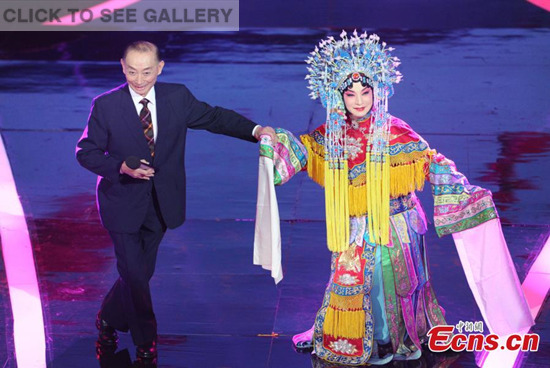The passing of a Peking Opera maestro this week has left the nation mourning the loss of another master.
Mei Baojiu, son of legendary Chinese theater mogul Mei Lanfang, died Monday in Beijing at the age of 82.
Barely a month ago, he was celebrating his 82nd birthday with students at the Beijing International Studies School.
Many recalled that Mei Baojiu was in high spirits, but the very next day, he slipped into a coma and never woke up.
"He gave his last bit of life to a cause he loved -- ensuring that traditional Chinese culture is passed on to the younger generation," said Song Lei, a Peking Opera performer who had worked with Mei.
DESTINED FOR OPERA
Mei Baojiu's father, Mei Lanfang, created an approach to Peking Opera that came to be known as the "Mei School". It features "nandan" (men playing female roles) as well as acting and singing styles unique to the school. The Mei School collective is the Mei Lanfang Peking Opera Troupe.
For many Peking Opera aficionados, the family name Mei is almost synonymous with the art. His father was one -- if not the most -- famous Peking Opera performers of the 20th century.
"He was his father's son," Song Lei said.
Mei Baojiu was born in 1934, the ninth and youngest child of his renowned father. Only four of Mei Baojiu siblings survived to adulthood. Had it not been for a cruel twist of fate, he might never have followed in his father's footsteps and taken up Peking Opera at all.
His brother Mei Baoqi, Mei Lanfang's third son, had been chosen to continue his father's legacy but his short life was ended by diphtheria when he was just eight.
"If my brother had not been a victim of the diphtheria pandemic, I might have been an engineer, like my other brothers," Mei Baojiu once said.
The stage was set for Mei Baojiu, his future was Peking Opera.
By ten, he was already training alongside famous Peking Opera artists including Yang Youqing and Zhu Chuanming. He began performing on stage at 13, and five years later he was sharing a stage with his father.
In 1961, after his father's death, Mei Baojiu took over the Mei Lanfang Peking Opera Troupe. He was halted from his performance career for some 14 years around the time of the Cultural Revolution; temporarily hanging up his stage garb for workers overalls, and set to his new job maintaining stereo equipment.
By 1978, Mei Baojiu returned to the stage. Although he was 44, and considered past the "golden age" for nandan roles, he managed to pull it off. His prestige continued to grow each year.
Like his father before him, Mei Baojiu made his name playing female roles in Peking Opera, such as consort Yu in "Farewell My Concubine," Yang Yuhuan in "Drunken Beauty", and Mu Guiying in "Lady General Mu Takes Command."
Tradition was important to Mei Baojiu.
Mei Baojiu told state television broadcaster CCTV in 2014 that everything he did was to ensure the art that he had "learned, acted, and taught" had a future.



















































